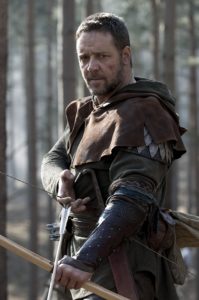PA Bill Number: HB2259
Title: Providing for actions not permissible in a courthouse; and imposing penalties.
Description: Providing for actions not permissible in a courthouse; and imposing penalties. ...
Last Action: Referred to Judiciary
Last Action Date: Mar 3, 2026
If You Like Robin Hood, You Should Like the Second Amendment (and Vice Versa) :: 08/04/2018
Every myth has a factual basis somewhere. At least that’s how the saying goes. So if you’ll indulge me, let me tell you what I think is interesting about the myth of Robin Hood. It’s not whether there was a factual character who went about “robbing the rich to give to the poor.” Nor am I interested in the romantic — his status as a merry outlaw roaming the forest like a cross between Thoreau and a dashing knight-errant. On the contrary, my interest lies in the timing of the myth, and the symbolism of it.

My thesis is simple: Robin Hood is an early avatar of the belief that men* are created equal, that rights are inherent to the individual, and that those rights include the right of self-defense.
First, let’s break down the myth. Robin Hood is given a backstory: he is nobly born, lives up to his responsibilities and undertakes the Third Crusade with his king; only to return home to find himself unjustly uprooted and dispossessed of his liberty and property. And thus begins the tale of Robin Hood: Avenger of the Common Law.
Every story (or episode, if you will) of Robin Hood deals with how the common principles of justice and fair play have been circumvented by the agents of a man (King John) who styles himself the absolute ruler of England. Robin Hood targets bishops who have been given permission by the king to steal what isn’t theirs. He robs unscrupulous merchants who are cronies of the king or his agents (and therefore are given some unfair advantage over the common man). He fights the Sheriff of Nottingham who abuses the people of the shire without regard for due process. He sneaks about, circumventing the unjust limits on freedom of movement and association. He kills and eats the king’s deer.
All of the evils our hero Robin faces run directly contrary to what the merry yeomen and their out-of-favor noble allies like Robin expect of the English government. They are free Englishmen. They expect the government to respect their common-law rights. To be able to hunt. To associate freely. To be able to enter contracts and carry on their business without government cronies interfering or engaging in self-dealing. The fact that so many of the Robin Hood stories still strike us as fair and just–that we still identify Robin Hood as a hero–speaks to what a powerful force English Common Law has been in entrenching ideas of justice and fairness in the law.
And English Common Law included the right to carry personal arms. And carry arms is exactly what Robin did (the much feared and extremely dangerous English Longbow**, responsible for evening the field between noble and commoner centuries before Sam Colt made all men equal), and how amazing is it that such a myth has flourished since the days when Old English was spoken? I submit that it’s no coincidence.
King John was eventually forced out onto a sandbar in the River Thames to sign the Magna Carta. The Magna Carta is one of the first (if not the very first) documents guaranteeing limited government and respect for individual rights. At the time, it was just the rights of the nobility which were protected — under the charter at least. But English Law was and still is comprised largely of case law. These are the laws of the people and their courts, beginning at the lowest level and percolating up. Laws which are sanctified and solidified through tradition and observance. Common Law represents government by the people and for the people, every bit as much as representation and voting do.
This means that seven or eight hundred years ago,when the English were sitting in pubs telling stories about themselves and living vicariously through Robin Hood: that even then, a man walking through the forest with his personal weapons while defying a king was a hero. Robin Hood was a hero who didn’t just stand up for the oppressed. No, Robin Hood stood for the primacy of everyone’s individual liberty in the face of an oppressive and illegitimate government. We know this because of the timing: just scant years before the ultimate villain of the Robin Hood mythology was forced to recognize individual liberty and the death of absolute monarchy in England. We also know it because of the symbolism: Robin Hood’s foes were the favored pets of the court, cronies who used King John’s authority to subvert the courts, and infringe on the rights of commoners and those disfavored by the king.
Sometimes Robin Hood is unfairly categorized in the modern political landscape. The point of Robin Hood is not that he should be some Antifa hero espousing oddball opinions about income inequality. On the contrary, the point of Robin Hood is to stand for the rule of law against the overbearing state. The point of Robin Hood is to stand against the moral hazard, corruption, and cronyism of unlimited governments. And, of course, to keep and bear arms explicitly for that purpose***.
*Read “humans” if you’re literal-minded, and your soul lacks any affinity for poetry or tradition.
**Or as some might call it: the English Assault-Longbow, with high capacity arrow-clip-magazine for maximum dangerousness. Implement of the common man, or state-of-the-art military killing machine in the streets of Old England? Maybe CNN can host Ye Olde Towne Hall and let us know.
***This does not in any way advocate for the violent overthrow of the government of the United States — limited government may be on life support, but we still mostly have a constitutionally limited republican form of government.
https://ricochet.com/540110/if-you-like-robin-hood-you-should-like-the-second-amendment/



